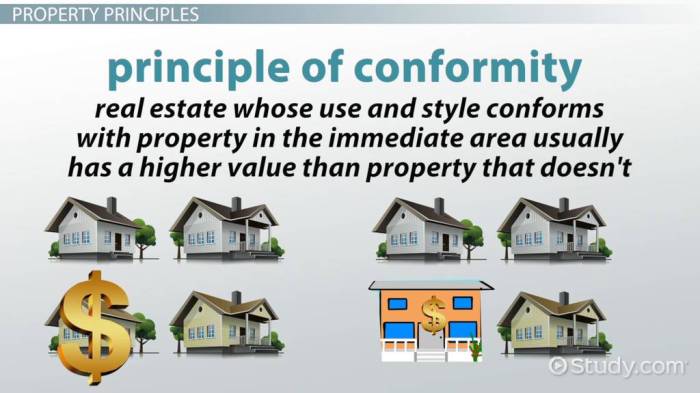Principle of conformity in real estate – The principle of conformity is a fundamental concept in real estate that significantly influences property values and market trends. It refers to the tendency for properties within a specific neighborhood or area to exhibit similar characteristics, such as architectural style, size, and amenities.
This introduction sets the stage for an in-depth exploration of the principle of conformity, its various types, benefits, and challenges in the real estate market.
Conformity plays a crucial role in shaping the desirability and marketability of properties. It contributes to neighborhood stability and enhances property values. However, it can also pose challenges by restricting innovation and individuality in property design. Understanding the principle of conformity is essential for real estate professionals, investors, and homeowners alike.
Definition of Principle of Conformity in Real Estate

The principle of conformity in real estate asserts that properties that align with the prevailing architectural, functional, and economic characteristics of their neighborhood tend to command higher value and enjoy greater marketability. This concept stems from the idea that buyers and investors seek properties that fit seamlessly within the established norms and expectations of the surrounding area.
Conformity plays a pivotal role in real estate markets, influencing property values and market trends. It ensures that neighborhoods maintain a cohesive aesthetic, preserve their character, and attract a wider pool of potential buyers.
Types of Conformity in Real Estate
Conformity in real estate manifests in various forms, each affecting property value and marketability in distinct ways:
- Architectural Conformity:Properties that share similar architectural styles, materials, and design elements tend to command higher value and appeal to a broader buyer base. This conformity creates a sense of harmony and cohesiveness within the neighborhood, making it more visually appealing and desirable.
- Functional Conformity:Properties that align with the functional needs and expectations of the neighborhood are more likely to attract buyers. For example, in a family-oriented neighborhood, homes with multiple bedrooms and bathrooms are more likely to be in high demand.
- Economic Conformity:Properties that fit within the economic profile of the neighborhood are more likely to sell quickly and for a fair price. This conformity ensures that the neighborhood remains balanced and does not experience significant price fluctuations or market volatility.
Benefits of Conformity in Real Estate
Conformity in real estate offers numerous benefits, including:
- Enhanced Property Value:Properties that conform to neighborhood norms typically command higher values due to their broader appeal and desirability.
- Increased Marketability:Conforming properties are easier to sell as they appeal to a wider pool of potential buyers who seek properties that fit seamlessly into the established neighborhood character.
- Neighborhood Stability:Conformity contributes to neighborhood stability by ensuring that new developments and renovations align with the existing aesthetic and functional standards, preserving the overall character and desirability of the area.
Challenges of Conformity in Real Estate
While conformity offers significant benefits, it can also pose certain challenges:
- Restriction on Innovation:Strict adherence to conformity can limit innovation and individuality in property design, potentially stifling creativity and architectural diversity.
- Potential for Monotony:Excessive conformity can lead to neighborhoods that lack visual interest and become monotonous, reducing their appeal and uniqueness.
- Impediment to Progress:In some cases, conformity can hinder progress and adaptation, making it difficult to introduce new amenities or architectural styles that may enhance the neighborhood’s overall livability and appeal.
Role of Conformity in Real Estate Market Analysis
Conformity is a key consideration in real estate market analysis, as it directly impacts property valuations and investment decisions:
- Property Valuations:Appraisers consider the degree of conformity when determining a property’s value. Properties that deviate significantly from neighborhood norms may be subject to value adjustments.
- Investment Decisions:Investors carefully assess conformity when making investment decisions. Properties that align with neighborhood characteristics are considered safer investments with a lower risk of depreciation.
Balancing Conformity and Individuality in Real Estate Development, Principle of conformity in real estate
Striking a balance between conformity and individuality is crucial in real estate development:
- Respecting Neighborhood Character:Developers should respect the established character of the neighborhood while incorporating unique design elements that enhance the overall appeal.
- Incorporating Variety:Developers can introduce variety within conformity by offering different floor plans, exterior finishes, or landscaping options that cater to diverse tastes while maintaining overall neighborhood cohesion.
- Encouraging Architectural Innovation:Developers can encourage architectural innovation by providing incentives or guidelines that promote creativity while ensuring that new designs align with the neighborhood’s overall aesthetic.
Case Studies of Conformity in Real Estate
Numerous case studies demonstrate the impact of conformity on property values and neighborhood development:
- Positive Impact:In the historic district of Charleston, South Carolina, strict adherence to architectural conformity has preserved the city’s unique character, resulting in increased property values and tourism.
- Negative Impact:In the planned community of Levittown, New York, excessive conformity led to monotonous neighborhoods with little visual interest, resulting in declining property values and a lack of neighborhood identity.
FAQ Summary: Principle Of Conformity In Real Estate
What is the principle of conformity in real estate?
The principle of conformity refers to the tendency for properties within a specific neighborhood or area to exhibit similar characteristics, such as architectural style, size, and amenities.
How does conformity affect property values?
Conformity can enhance property values by contributing to neighborhood stability and desirability. Properties that conform to the prevailing architectural style and neighborhood norms tend to be more sought-after and command higher prices.
What are the challenges of conformity in real estate?
Conformity can restrict innovation and individuality in property design. It may also lead to a lack of diversity and character in neighborhoods.
How is conformity considered in real estate market analysis?
Conformity is a key factor considered in real estate market analysis. It influences property valuations and investment decisions. Properties that conform to the prevailing market trends are generally considered less risky and more desirable.









